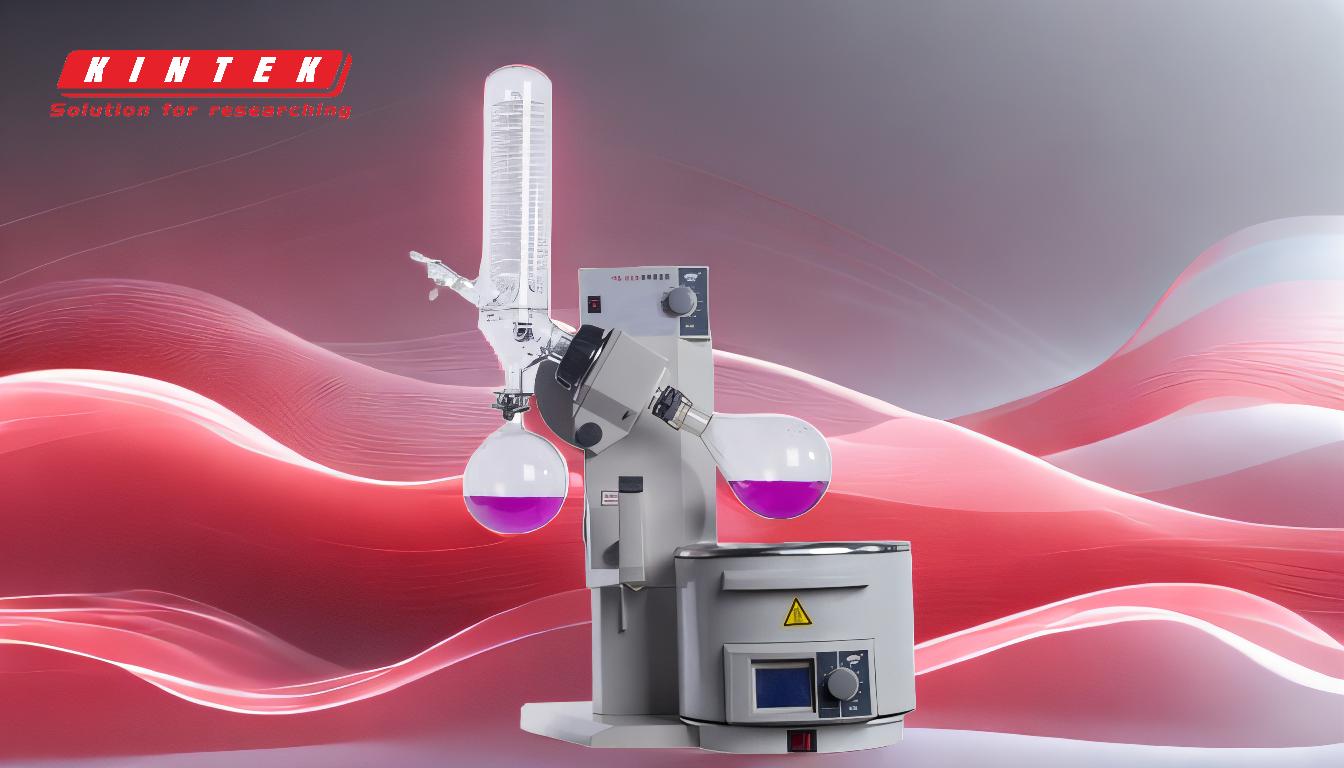Rotary evaporation is a versatile and widely used technique across multiple industries, primarily for the separation, distillation, recovery, drying, and concentration of solvents. Its applications span chemical laboratories, pharmaceutical research, food and beverage production, essential oil extraction, biotechnology, and even cannabis extraction. The process is particularly valued for its efficiency in solvent removal, concentration of solutions, and preparation of samples for further analysis. Below, we explore the key applications of rotary evaporation in detail.
Key Points Explained:

-
Solvent Separation and Distillation
- Rotary evaporators are extensively used to separate solvents with different boiling points. This is particularly useful in chemical synthesis and purification processes.
- The technique allows for the selective evaporation of one solvent from a mixture, leaving behind the desired compound or solution.
- For example, in chemical labs, rotary evaporation is used to isolate specific compounds from reaction mixtures or to recover solvents for reuse.
-
Concentration of Solutions
- One of the most common applications of rotary evaporation is the concentration of solutions. By evaporating the solvent, the solute is left in a more concentrated form.
- This is particularly important in pharmaceutical research, where active pharmaceutical ingredients (APIs) need to be concentrated for further processing or analysis.
- In the food and beverage industry, rotary evaporators are used to concentrate flavors, essences, and extracts.
-
Drying of Samples
- Rotary evaporators are used to dry samples by removing solvents or water. This is crucial in preparing samples for freeze-drying or other analytical techniques.
- In biotechnology and pharmaceutical labs, drying is essential for preserving the stability and shelf life of sensitive compounds.
-
Extraction of Natural Compounds
- Rotary evaporation is widely used in the extraction of natural compounds, such as essential oils, plant extracts, and bioactive molecules.
- The process is gentle and efficient, making it suitable for heat-sensitive compounds that might degrade under harsh conditions.
- In the cannabis industry, rotary evaporators are used to remove solvents from cannabis extracts, ensuring a pure and safe final product.
-
Chemical Synthesis Under Reflux
- Rotary evaporators can be used in chemical synthesis to control reactions under reflux conditions. This allows for precise temperature control and efficient solvent recovery.
- This application is particularly valuable in organic chemistry labs, where reactions often require the removal of solvents or by-products.
-
Preparation for Freeze-Drying
- Rotary evaporation is often used as a preparatory step for freeze-drying (lyophilization). By removing the bulk of the solvent, the sample is ready for the freeze-drying process, which preserves the structure and integrity of sensitive materials.
- This is especially important in the pharmaceutical and biotechnology industries, where preserving the biological activity of compounds is critical.
-
Testing and Analysis of Vaporized Substances
- Rotary evaporators allow for the collection of vaporized substances in a receiving flask, enabling further testing and analysis.
- This is useful in research labs where the composition of the vaporized substance needs to be determined, or where the purity of a compound must be verified.
-
Versatility Across Industries
- Rotary evaporation is employed in a wide range of industries, including:
- Chemical Industry: For solvent recovery, purification, and synthesis.
- Pharmaceutical Industry: For drug development, API concentration, and sample preparation.
- Food and Beverage Industry: For flavor concentration, extraction, and product development.
- Biotechnology: For drying and preserving biological samples.
- Cannabis Industry: For solvent removal and product purification.
- Petrochemical Industry: For the separation and analysis of hydrocarbon mixtures.
- Rotary evaporation is employed in a wide range of industries, including:
-
Efficiency and Cost-Effectiveness
- Rotary evaporators are known for their efficiency in solvent removal, which reduces waste and lowers operational costs.
- The ability to recover and reuse solvents makes the process environmentally friendly and economically viable for many industries.
-
Customization for Specific Needs
- The specific use of a rotary evaporator depends on the laboratory's requirements and the nature of the substances being processed.
- Modern rotary evaporators come with adjustable parameters such as temperature, pressure, and rotation speed, allowing for precise control over the evaporation process.
In summary, rotary evaporation is a highly adaptable and essential technique in modern laboratories and industries. Its ability to efficiently separate, concentrate, and dry substances makes it indispensable in fields ranging from pharmaceuticals to food production. The process is not only effective but also customizable, ensuring that it meets the specific needs of diverse applications.
Summary Table:
| Application | Key Use Cases |
|---|---|
| Solvent Separation & Distillation | Isolates compounds, recovers solvents for reuse in chemical labs. |
| Concentration of Solutions | Concentrates APIs in pharmaceuticals, flavors in food and beverage production. |
| Drying of Samples | Prepares samples for freeze-drying, preserves stability in biotech and pharma. |
| Extraction of Natural Compounds | Extracts essential oils, plant extracts, and bioactive molecules. |
| Chemical Synthesis Under Reflux | Controls reactions, recovers solvents in organic chemistry labs. |
| Preparation for Freeze-Drying | Removes bulk solvents, preserves sensitive materials for lyophilization. |
| Testing & Analysis | Collects vaporized substances for purity verification and composition analysis. |
| Versatility Across Industries | Used in chemical, pharmaceutical, food, biotech, cannabis, and petrochemical. |
| Efficiency & Cost-Effectiveness | Reduces waste, lowers costs, and enables solvent recovery. |
| Customization | Adjustable parameters for precise control in diverse applications. |
Discover how rotary evaporation can optimize your lab processes—contact us today for expert advice!












